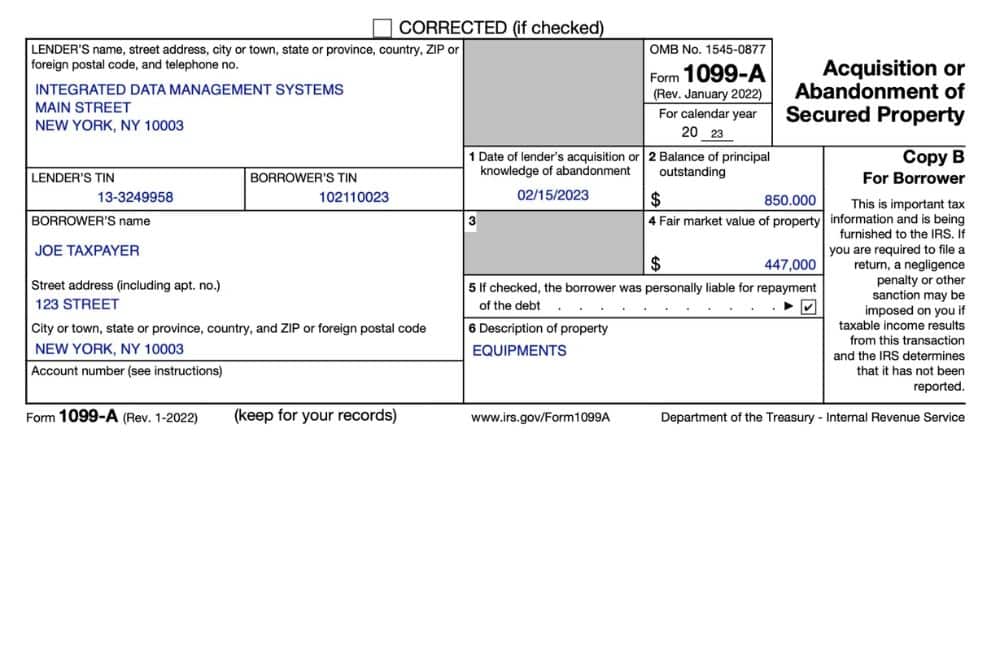What Is a 1099 Form—and How Does It Affect Your Expat Taxes?

If you’re an American living abroad and earning as an independent contractor or freelancer, you may have encountered the term ‘1099’ in relation to tax documentation. But what is a 1099 form, exactly? The 1099 form is a series of documents the Internal Revenue Service (IRS) uses to report various types of income other than wages, salaries, and tips.
As an American expat, it’s critical to understand the nuances of how 1099 forms apply to your foreign-earned income and your US tax obligations. This guide provides a clear explanation of the 1099 form, its purpose for expats, and how to navigate the complexities of reporting your international income accurately.
Key Takeaways
- Form 1099 is an informational tax form used to report payments made to independent contractors, subcontractors and corporations who don’t receive a W-2 form.
- A copy of each form 1099 is also sent to the IRS and the IRS can match the information they have on your 1099 to your tax return.
What Is Form 1099?
IRS Form 1099 is an “information tax return.” It is used to report various types of income. You will receive the appropriate version of the form based on the type of income you have earned.
For example, if you’ve received interest from money stored in a bank account or other financial institution, you may receive Form 1099-INT (INT stands for interest). If you’ve earned income as a freelancer, you may receive Form 1099-NEC (NEC stands for Non-Employee Compensation).
Dreading the last minute scramble pulling together your tax documents? Despair no more! This simple checklist lists the documents you need to have on hand when preparing to file.

Who Receives a 1099 Form?
Non-employment income and other forms of income are reported using a 1099 form. You will likely receive a copy of the Form if you’ve earned a sufficient amount of non-employment income.
The type of 1099 form you receive will tell you what form of income is being reported to you. Let’s go over the options.
Types of 1099 Forms
Form 1099-A
Acquisition or Abandonment of Secured Property is used to report the foreclosure of a property. You might receive this form if your mortgage lender foreclosed on your property, canceling some or all of your debt. This is because canceled debt is income in the eyes of the IRS and is thus taxable.

Form 1099-B
Proceeds from Broker and Barter Exchange Transactions are used to report income from the sale of certain securities, such as:
- Stocks
- Commodities
- Regulated futures contracts
- Foreign currency contracts
- Forward contracts
- Debt instruments
- Options
Form 1099-B is also used to report income from bartering through an exchange, such as a bartering website. (Typically, if you barter with someone directly—outside of exchange—you will not receive a 1099 form, though you may still be required to report any income.)
These are also known as Consolidated 1099’s because they typically include information on other types of income reported all on the same 1099. You will normally find interest information and dividend information on a 1099-B instead if it is reported separately on a 1099-INT for interest and a form 1099-DIV for dividends.
Form 1099-C
Cancellation of Debt reports most forms of canceled debt. As mentioned above, canceled debt is income as far as the IRS is concerned. Even if the lender merely agreed to settle for less than you originally owed, any amount forgiven is likely taxable.


Form 1099-CAP
Changes in Corporate Control and Capital Structure is used to report income received from shares in a corporation that underwent a major change in capital structure. This income may come in the form of cash, stock, or property.

Form 1099-DIV
It is used to report any dividends or distributions you’ve received. (This does not include dividends from a share account at a credit union. That would qualify as interest and thus appear on Form 1099-INT instead.)

Form 1099-G
Certain Government Payments is used to report income received from the state, local, or federal government. This may include:
- Tax refunds, credits, or offsets
- Unemployment income
- Reemployment trade adjustment assistance (RTAA) payments
- Taxable grants
- Agricultural payments
You may also receive this 1099 form if you collect payments on a Commodity Credit Corporation (CCC) loan.

Form 1099-INT
Interest Income is used to report certain types of interest income. In most cases, this means interest from a bank, brokerage account, or other financial institution. However, the 1099-INT form may also be used to report interest from the sale of U.S. Treasury bills, notes, and bonds.

Form 1099-K
Payment Card and Third-Party Network Transactions is used to report payments sent via credit card or a third-party payment system, such as:
- Venmo
- Cash App
- PayPal

Form 1099-LTC
Long Term Care and Accelerated Death Benefits is used to report any type of long-term care benefits, including accelerated death benefits. These benefits may come from:
- Insurance companies
- Government agencies
- Viatical settlement providers
Form 1099-MISC
Miscellaneous Income is used to report all forms of income that don’t fit neatly into the other 1099 form categories. Common examples include:
- Rental income
- Prizes and awards
- Medical and health care payments
- Payments to an attorney
- Crop insurance proceeds
- Payments from a notional principal contract

Form 1099-NEC
Non-employee compensation reports income earned as freelancers, independent contractors, or other self-employed professionals. Previously, this type of income was reported using Form 1099-MISC, but the IRS created Form 1099-NEC in 2020 to cover this category.

Form 1099-OID
Original Issue Discount is used to report buying bonds, notes, or other financial instruments at a discount. This discount is measured against the face value of the financial instrument or its redemption value at maturity. (Typically, the instrument must have more than one year of maturity.)

Form 1099-PATR
Taxable Distributions Received from Cooperatives is used to report patronage dividends or other distributions from a co-op.

Form 1099-Q
Payments from Qualified Education Programs are used to report payments that you, your child, or your child’s school received from a 529 college savings plan. (Keep in mind that when used for qualified education purposes, 529 payments are generally not subject to tax. Thus, this 1099 form will only be for record keeping in most cases.)

Form 1099-R
Distributions from Pensions, Annuities, Retirement or Profit-Sharing Plans, IRAs, Insurance Contracts, etc., is used to report distributions from a wide variety of sources. In this case, most of the sources are listed in the title of the form.
Loans taken from your retirement plan and treated as a distribution will also probably appear on this form. The same is true for permanent and total disability payments under life insurance contracts.

Form 1099-S
Proceeds from Real Estate Transactions is used to report gains from the sale or exchange of real estate.

Form 1099-SA
Distributions from an HSA, Archer MSA, or Medicare Advantage MSA is used to report distributions from several health-related savings accounts. (As with many other 1099 forms on this list, the payments reported are generally not taxable when used for qualified expenses.)

What Should I Do if I Receive a 1099 Form?
Receiving a 1099 form does not mean that you owe any additional taxes. Most 1099 forms record the non-employment income you’ve received without creating a tax liability.
However, when filing your annual US tax return, you will typically have to report the details on your Form 1099. If you’ve received a Form 1099, you can be certain that the IRS has the same information. If you fail to report any income—whether or not that income is taxable—you could face penalties.
And, of course, some 1099 forms will require that you pay taxes on the income received. This often includes:
- Form 1099-NEC
- Form 1099-DIV
- Form 1099-C
- Form 1099-B
…and others. If you’ve received a 1099 form, consult a qualified tax professional to learn how it may impact your expat tax return.
The good news is that even if you do owe taxes on your 1099 income, you may be able to reduce or even erase that tax debt entirely. This is because the IRS provides several tax benefits for Americans living abroad.
What Tax Deductions Are Available for US Expats?
1. Foreign Earned Income Exclusion
The Foreign Earned Income Exclusion lets expats exclude a certain amount of foreign-earned income from US taxation. The exclusion amount changes from year to year. For foreign income earned in the 2023 tax year, the exclusion is set at $120,000.
If you qualify for the Foreign Earned Income Exclusion, you can claim it by filing IRS Form 2555. Typically, this is only for self-employment income.
Use our simple excel calculator to get an estimate of how the foreign earned income exclusion will save you money. It will make your day!

2. Foreign Tax Credit
Using the Foreign Tax Credit, expats can deduct any income taxes they paid to a foreign government from their US tax bill—dollar for dollar. This will reduce the risk of double taxation.
If you qualify for the Foreign Tax Credit, you can claim it by filing IRS Form 1116.
3. Foreign Housing Exclusion
The Foreign Housing Exclusion allows self-employed expats to deduct housing-related expenses from their US tax bill.
This exclusion is only available if you also claim the Foreign Earned Income Exclusion. If you qualify for both, you can claim both using Form 2555.
What If I’m Behind on My Expat Taxes?
All US citizens are required to file a US tax return every year, no matter where they live—from Tucson to Tokyo. However, many Americans living overseas are unaware of this obligation.
If you’re one of the myriad expats who didn’t know they had to file a US tax return, don’t panic. The IRS offers an amnesty program so expats may come into compliance without facing any penalties. It’s known as the Streamlined Filing Compliance Procedures.
To use this program, all you have to do is:
- Self-certify that you failed to file out of ignorance rather than a willful refusal
- File the last three delinquent income tax returns and pay any taxes you owed during that time (with interest)
- File Foreign Bank Account Reports (FBARs) for the last six years
Once you’ve taken these steps, the IRS will consider you to be in compliance with their regulations.
Receiving a 1099 Form Shouldn’t Be Complicated
We hope this guide has helped you understand what your 1099 form means and what you should do when you receive one. If you’re ready to be matched with a Greenback accountant, click the get started button below. For general questions on expat taxes or working with Greenback, contact our Customer Champions.



